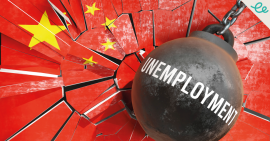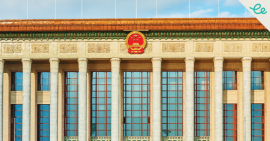In a year bookended by major events, Xi Jinping can’t back out of strict “zero-Covid” policy
China and Xi Jinping should have plenty to celebrate in 2022. The Chinese New Year of the Tiger kicks off on 1 February. Three days later, the Beijing Winter Olympics begin, when Xi can showcase the Chinese Communist Party’s unrivalled organisational abilities. The year should climax with his triumphant emergence, after a crucial Party Congress this coming autumn, as Party chief for a third term. But Covid-19 threatens to spoil all these parties.
Despite some of the toughest controls and protocols worldwide, China ended 2021 with Xian in lockdown. A spike in Covid-19 cases confined 13 million people to their homes, shuttered businesses, sparked complaints about food shortages – and led to tragedy.
A top health official apologised in January over the miscarriage of an eight-month-pregnant woman. Footage went viral of a hospital refusing her entry without a Covid test. Yet China’s no-holds-barred approach, driven by Xi’s “zero Covid” strategy, continues to enjoy widespread support in a nation that also has zero tolerance of public dissent.
In this post, we’ll examine China’s Covid-19 policy and how it manages outbreaks. With the more infectious Omicron variant spreading worldwide, authorities may struggle to limit cases during the Chinese New Year travel rush nationwide. The Beijing Olympics also poses a risk, even with the athletes performing in Covid-emptied venues as in Tokyo last year.
More broadly, we believe China’s “zero Covid” approach presents serious economic and political challenges to the Party as Xi battles to maintain the stability and security he craves in this crucial year for his rule.
Zero means zero
China was the first country to detect and identify the new virus, in late 2019/early 2020. Its origins remain masked by political barriers unlikely to be lifted anytime soon. But one thing appears clear – China will be the last country to relax the “zero Covid” strategy also implemented by other Asia-Pacific nations. And its borders look likely to stay largely sealed until 2023.
Zero tolerance has worked for China, at least in the primary responsibility of keeping citizens alive. Strict lockdowns in Wuhan and elsewhere in the early months have kept China’s official death toll to just 4,636. That remarkably low figure has barely budged since May 2020. For comparison, Northern Ireland (pop. 1.9m) suffered 4,024 Covid-related deaths by the end of 2021.
Can the world trust Chinese government stats on Covid-19 cases and deaths, given its highly dubious track record? Many experts consider them plausible. “The government does have an incentive to paint a rosy picture of its pandemic efforts, but I think a deliberate cover-up of the cases is unlikely,” health analyst Yanzhong Huang told ABC.
Here’s one example to show how China tackles the virus. In Yuzhou, central Henan province, just three asymptomatic cases in January were enough to trigger the draconian measures China has deployed whenever outbreaks threaten. The city forbade its 1.1 million residents to leave town or their homes. Some 5,000 quarantine rooms were prepared. Residential communities posted sentries at housing compound gates to catch rule-breakers. Public transport was suspended and no cars allowed on the road.
What’s the magic formula?
Beijing has a formula it calls “dynamic zero” for curbing outbreaks: strict lockdowns and immediate mass testing. “There is still no ability to stop single local cases from appearing, but we have the ability and confidence to quickly extinguish the outbreak when a local case is found,” explained National Health Commission official Liang Wannian.
Technology plays a major role: Xian suspended its data chief after the system powering the local health code app, a critical tool in enforcing “zero Covid”, crashed for a second time. So does the very real fear of being hauled off to quarantine venues. Despite public complaints, Xian officials defended the widespread use of centralised quarantine as an effective measure to cut transmission.
As James Palmer noted for Foreign Policy, lockdowns work well in China because most urban Chinese live in walled compounds of large apartment blocks, with controllable entry and exit points. Rural villages often have a single road out. And even before 2020, the state had implemented surveillance infrastructure for political control.
Covid-19 risks in January & February
The lunar new year holiday, China’s most important, gives citizens seven days off work, from January 31 to February 6. But many people travel back to their hometowns ahead of the official break, in the largest annual migration on earth. This “chunyun” travel season, lasting roughly from January 17 to February 25, will test local authorities tasked with fighting Covid.
The Winter Olympics, also pose a risk, despite strict plans to keep foreign athletes and officials away from China’s public. “A large number of overseas personnel will gather, causing a very high risk of transmission,” admitted an epidemic official in December.
Why Xi can’t back down on “zero Covid”
The health risks of opening China up to Covid-19 are likely to be higher than in countries that abandoned “zero Covid” policies. This is what health researcher Sean Yuji Sylvia told The Guardian. Strict controls still make sense given high population density, lower herd immunity due to limited exposure and less-effective vaccines, and a weak health system manned by doctors with little clinical experience of treating Covid.
Then there’s politics. The concerns for social stability are driving ”China’s ‘zero-Covid’ policy. The regime sees Covid-19, Sars, and other epidemics or pandemics as health crises that may turn into social crises.
For Xi Jinping, and his Communist Party, political legitimacy is at stake. When Covid first exploded, the pandemic threatened a Chernobyl moment for China. Beijing mobilised a massive, highly effective “people’s war” to stamp out the threat. And the Party turned disaster into triumph. The propaganda apparatus has enjoyed highlighting the poor Covid responses mustered by China’s Western critics.
Now that Omicron is threatening to climb China’s mighty firewall, Xi is backed into a political corner. He must stick to “zero Covid” or risk losing public trust. Beijing can deflect public anger onto local officials, who are regularly disciplined for Covid breaches. But if Omicron is as transmissible as it seems, Charles Parton wrote in The Telegraph, “even totalitarian tools may be insufficient to hold back a racing tide.”
Related articles:
This Party Keeps on Rocking – https://blog2.enodoeconomics.com/2021/07/01/this-party-keeps-on-rocking/
Chinese New Year 2022 – https://blog2.enodoeconomics.com/2022/01/31/chinese-new-year-2022/







